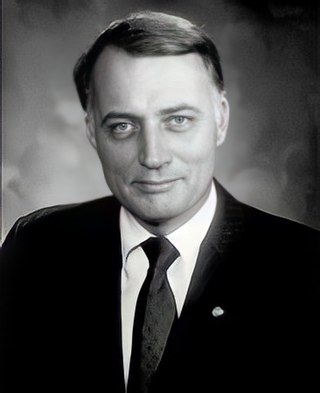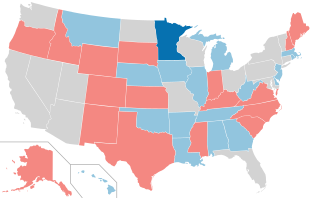
Mark Brandt Dayton is an American politician who served as the 40th governor of Minnesota from 2011 to 2019. He served as a United States Senator representing Minnesota from 2001 to 2007 and as Minnesota State Auditor from 1991 to 1995. He is a member of the Minnesota Democratic–Farmer–Labor Party (DFL), which affiliates with the national Democratic Party.

Rodney Dwight Grams was an American politician and television news anchor who served in both the United States House of Representatives and the U.S. Senate. A local news anchor, Grams became well-known for working at Twin Cities station KMSP-TV from 1982 until 1991. He was a member of the Republican Party.

David Ferdinand Durenberger was an American politician and attorney. Durenberger represented Minnesota in the United States Senate as a Republican from 1978 to 1995. He left the Republican Party in 2005 and became a critic of it, endorsing Democratic presidential nominees Hillary Clinton and Joe Biden in 2016 and 2020, respectively.

The Republican Party of Minnesota is the state affiliate of the Republican Party in Minnesota and the oldest active political party in the state. Founded in 1855, the party is headquartered in Edina, and the current chairman is David Hann.

The 2002 United States Senate elections featured a series of fiercely contested elections that resulted in a victory for the Republican Party, which gained two seats and thus a narrow majority from the Democratic Party in the United States Senate. The Senate seats up for election, known as class 2 Senate seats, were last up for regular election in 1996. The election cycle was held on November 5, 2002, almost 14 months after the September 11, 2001, attacks.

The 2000 United States Senate elections were held on November 7, 2000. The elections coincided with other federal and state elections, including the presidential election which was won by Republican George W. Bush. These elections took place 6 years after Republicans had won a net gain of 8 seats in Senate Class 1. Despite George W. Bush's victory in the presidential election, the Republicans lost 4 senate seats, the most a winning president's party has lost since the passage of the 17th Amendment. This election marked the first election year since 1990 where Democrats made net gains in the Senate. Democrats defeated incumbent Republicans in Delaware, Michigan, Minnesota, Missouri, and Washington, and they won an open seat in Florida. In Missouri, the winner was elected posthumously. The Republicans defeated a Democratic incumbent in Virginia, and won an open seat in Nevada. Additionally, a Republican in Georgia died earlier in the year and a Democrat was appointed to replace him, who then went on to win the special election.

The 1996 United States Senate elections were held on November 5, 1996, with the 33 seats of Class 2 contested in regular elections. Special elections were also held to fill vacancies. They coincided with the presidential election of the same year, in which Democrat Bill Clinton was re-elected president.

The 1990 United States Senate elections were held on Tuesday, November 6, 1990, with the 33 seats of Class 2 contested in regular elections. Special elections were also held to fill vacancies. The Democratic Party increased its majority with a net gain of one seat from the Republican Party. The election cycle took place in the middle of President George H. W. Bush's term, and as with most other midterm elections, the party not holding the presidency gained seats in Congress.

The 1988 United States Senate elections were elections for the United States Senate. Held on November 8, 1988, the 33 seats of Class 1 were contested in regular elections. In spite of the Republican victory by George H. W. Bush in the presidential election, the Democrats gained a net of 1 seat in the Senate. 7 seats changed parties, with 4 incumbents being defeated. The Democratic majority in the Senate increased by one to 55–45.

The 1984 United States Senate elections were held on November 6, with the 33 seats of Class 2 contested in regular elections. They coincided with the landslide re-election of President Ronald Reagan in the presidential election. In spite of the lopsided presidential race, Reagan's Republican Party suffered a net loss of two Senate seats to the Democrats, although it retained control of the Senate with a reduced 53–47 majority. Democrats defeated incumbents in Illinois and Iowa, and won an open seat in Tennessee, while Republicans defeated an incumbent in Kentucky.

The 1982 United States Senate elections were held on November 2, 1982. They were elections for the United States Senate following Republican gains in 1980. The 33 Senate seats of Class 1 were up for election in 1982. A total of four seats changed hands between parties, with Democrats winning seats in New Jersey and New Mexico, and Republicans taking seats in Nevada and the seat of the lone independent, Senator Harry Byrd Jr., in Virginia. Democrats made a net gain of one seat bringing them to 46 seats, while Republicans stayed at 54 seats for a majority. However, the Democratic gain in New Jersey replaced a Republican that had been appointed earlier in the year. Liberal Republicans senators in Connecticut, Rhode Island and Vermont held onto their seats, keeping the Senate in Republican hands.

The 1978 United States Senate elections were held on November 7, in the middle of Democratic President Jimmy Carter's term. The 33 seats of Class 2 were contested in regular elections. Special elections were also held to fill vacancies.

The 1958 United States Senate elections were elections for the United States Senate which occurred in the middle of President Dwight D. Eisenhower's second term. Thirty-two seats of Class 1 were contested in regular elections, the new state of Alaska held its first Senate elections for its Class 2 and 3 seats, and two special elections were held to fill vacancies.

The 2012 United States Senate elections were held on November 6, 2012, with 33 of the 100 seats in the Senate, all Class 1 seats, being contested in regular elections whose winners would serve 6-year terms beginning January 3, 2013, with the 113th Congress. Democrats had 21 seats up for election, plus 1 Independent, and 1 Independent Democrat, while the Republicans only had 10 seats up for election. The presidential election, elections to the House of Representatives, elections for governors in 14 states and territories, and many state and local elections were also held on the same day.
Satveer Singh Chaudhary is an American criminal defense and immigration lawyer. He is also a politician and a former member of the Minnesota State Senate and the Minnesota House of Representatives serving from 1996 to 2010.

The 2000 United States Senate election in Minnesota was held on November 7, 2000, to select a U.S. senator from the state of Minnesota. The race pitted incumbent Republican Senator Rod Grams against former Minnesota State Auditor Mark Dayton. Dayton won with 48.83% of the vote to Grams's 43.29%. Dayton declined to run for reelection in 2006 and ran successfully in 2010 and 2014 for governor of Minnesota. He was succeeded in the Senate by Amy Klobuchar, who has held the seat ever since. Upon Dayton's swearing in, Democrats held both of Minnesota's U.S. Senate seats for the first time since 1978. As of 2024, this is the last time that a man won the Class 1 Senate seat in Minnesota.

The 1988 United States Senate election in Minnesota was held on November 8, 1988. Incumbent Republican U.S. Senator David Durenberger won re-election to his third term. He was challenged by democratic Hubert "Skip" Humphrey III, the son of former vice president Hubert Humphrey. The seat had previously been held by both of Skip Humphrey's parents. This is the last time that Minnesota voted for a Senate candidate and a presidential candidate of different political parties as Durenberger, a liberal Republican, remained popular among Minnesotans during his tenure in the Senate.

The 1992 United States Senate election in Kentucky took place on November 3, 1992. It was concurrent with elections to the United States House of Representatives. Incumbent Senator Wendell Ford won reelection to a fourth and final term. As of 2023, this was the last time Democrats won a U.S. Senate election in Kentucky.

The 1978 United States Senate election in Minnesota was held on November 7, 1978. Incumbent Democratic U.S. Senator Wendell Anderson was defeated by Republican challenger Rudy Boschwitz.

The 1978 United States Senate special election in Minnesota was held on November 7, 1978. Democratic candidate Bob Short was defeated by Republican candidate David Durenberger.






















